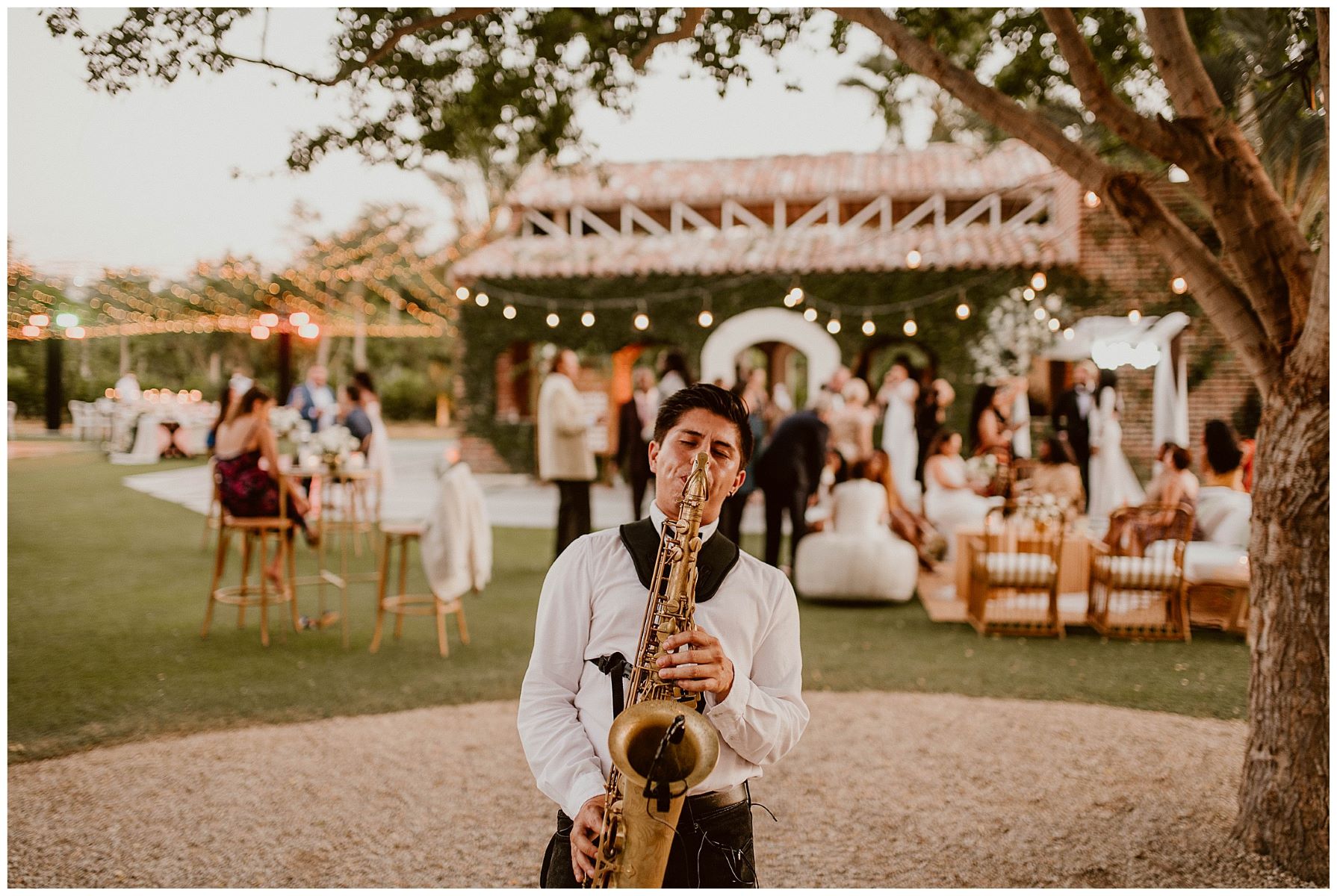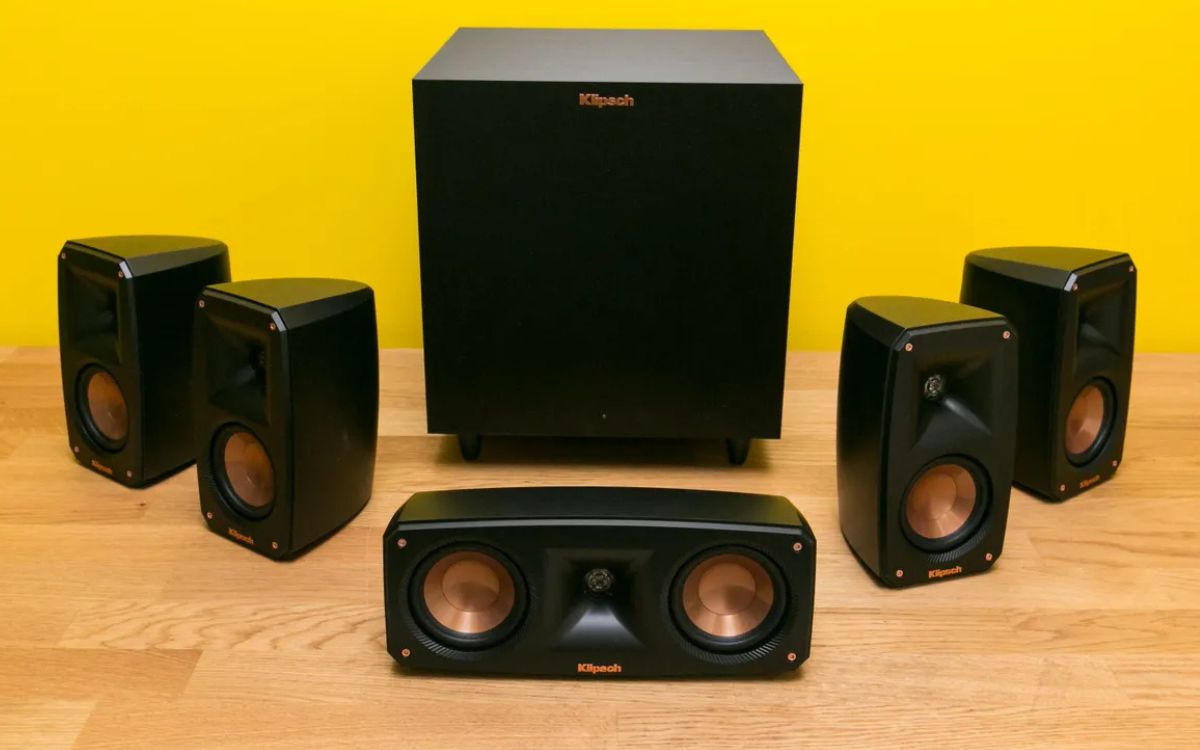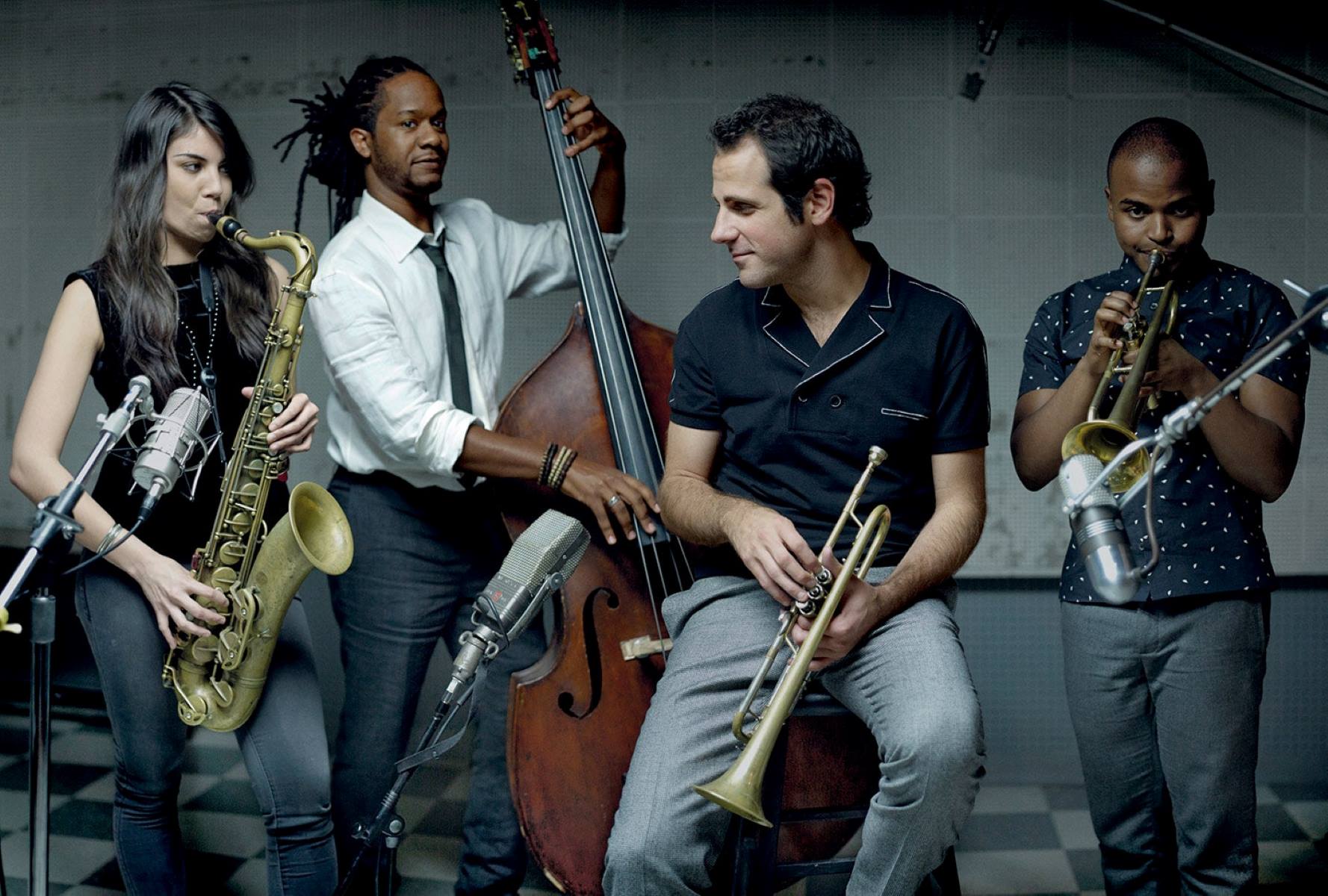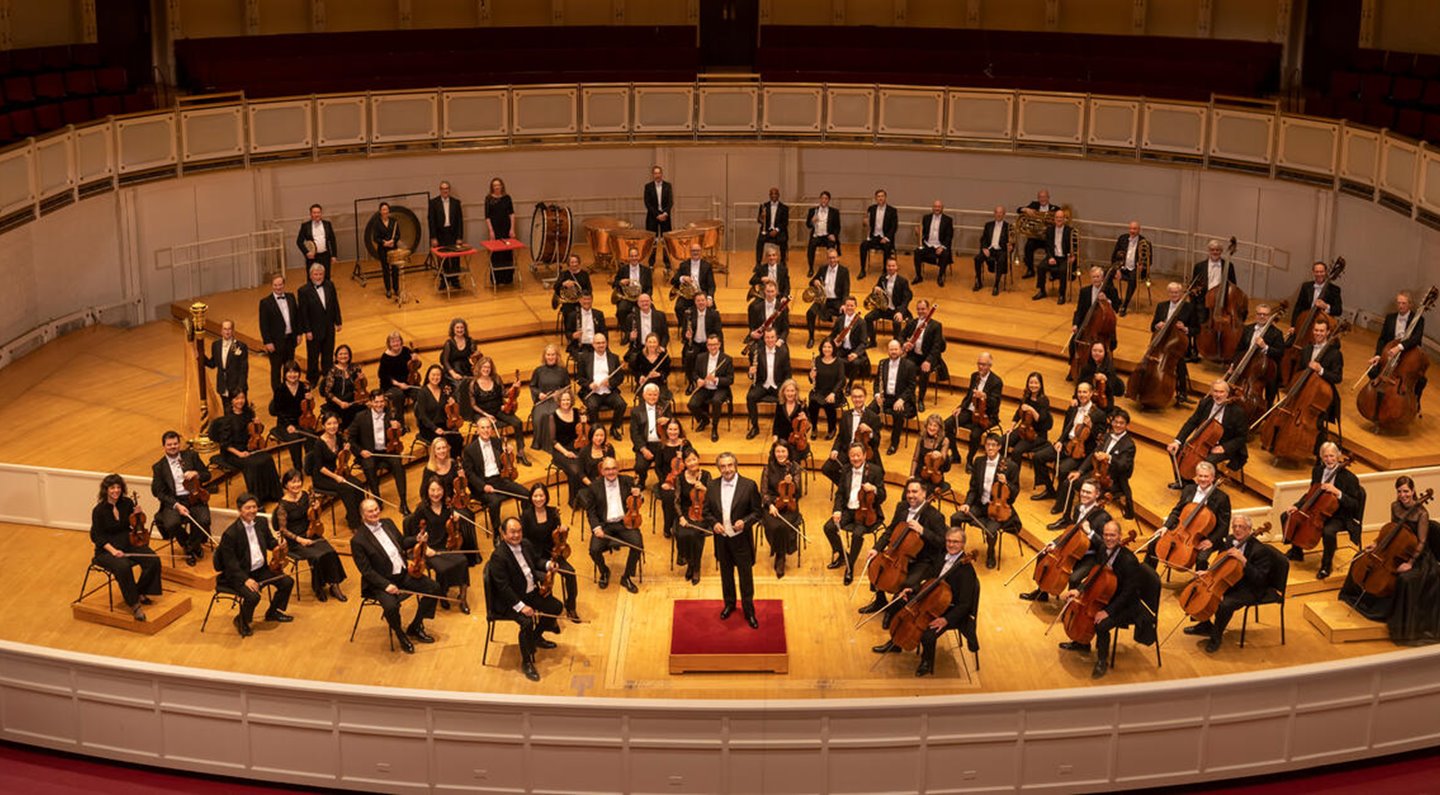Home>Production & Technology>Musician>How To Market Yourself As A Musician


Musician
How To Market Yourself As A Musician
Published: January 28, 2024
Learn how to effectively market yourself as a musician and increase your visibility in the industry. Discover essential strategies to grow your fan base and boost your music career.
(Many of the links in this article redirect to a specific reviewed product. Your purchase of these products through affiliate links helps to generate commission for AudioLover.com, at no extra cost. Learn more)
Table of Contents
- Introduction
- Building Your Brand
- Creating Your Online Presence
- Utilizing Social Media
- Networking and Collaborating
- Leveraging Live Performances
- Getting Your Music on Streaming Platforms
- Engaging with Your Fans
- Collaborating with Influencers and Bloggers
- Pitching Your Music to Media Outlets
- Building a Press Kit
- Leveraging Music Contests and Opportunities
- Developing a Merchandise Strategy
- Seeking Sponsorships and Endorsements
- Generating Income through Licensing and Sync Opportunities
- Utilizing Email Marketing
- Tracking and Analyzing Your Success
- Staying Persistent and Consistent
- Conclusion
Introduction
Being a musician is a dream for many people, but it takes more than talent to succeed in the competitive music industry. In addition to creating great music, you also need to market yourself effectively to gain visibility and attract a loyal fanbase. The good news is that with the right strategies and tools, you can successfully market yourself as a musician and carve out a successful career in the music industry.
In this article, we will explore various methods to help you market yourself as a musician. From building your brand and creating an online presence to leveraging social media and engaging with your fans, we will cover a wide range of tactics that can help you gain recognition and grow your music career.
The key to successful self-promotion as a musician lies in authenticity and creativity. Your brand should reflect who you are as an artist and what makes your music unique. It’s not just about selling your music; it’s about telling your story and connecting with your audience.
Whether you’re an aspiring singer-songwriter, a passionate guitarist, or a talented producer, this article will provide you with valuable insights and actionable strategies to market yourself effectively and stand out in the music industry.
So let’s dive in and discover how you can take your music career to the next level!
Building Your Brand
Building a strong and recognizable brand is crucial in the music industry. Your brand represents who you are as an artist and connects you with your target audience. Here are some key steps to help you build your brand:
1. Define Your Identity: Start by defining your unique identity as a musician. What sets you apart from others? What is your style, genre, or niche? Think about your image, values, and the message you want to convey through your music.
2. Develop a Visual Identity: Your visual identity plays a significant role in shaping your brand. Create a memorable logo, choose consistent colors and fonts, and design album covers and promotional materials that reflect your style. Consistency in your visual representation is key to building a recognizable brand.
3. Craft Your Story: Every musician has a story, and sharing yours can be a powerful way to connect with your audience. Share your journey, inspirations, and challenges to create a personal connection with your fans.
4. Consistent Online Presence: Establish a strong online presence through a dedicated website and social media platforms. Maintain consistent branding across all your online channels. Use high-quality images, videos, and engaging content to showcase your music and interact with your fans.
5. Engage with Your Target Audience: Know who your target audience is and actively engage with them. Respond to comments and messages, ask for suggestions, and show genuine interest in your fans. Building a strong fan base requires building relationships with your audience.
6. Collaborate with Other Artists: Collaborating with other musicians or artists can expand your reach and introduce your music to new audiences. Seek out opportunities to collaborate on projects, performances, or even joint releases to tap into new fan bases and gain exposure.
7. Be Authentic: Stay true to yourself and your music. Authenticity is a powerful asset in building a strong brand. Your fans will connect with you on a deeper level if they can relate to your authenticity.
Building your brand takes time and effort, but it is a crucial step in marketing yourself as a musician. A well-defined brand will help you stand out in a crowded industry and attract a loyal fanbase that connects with your music and supports your career.
Creating Your Online Presence
In today’s digital age, having a strong online presence is essential for musicians. It allows you to reach a global audience, promote your music, and connect with fans. Here are some key steps to create an effective online presence:
1. Build a Professional Website: Your website serves as the central hub of your online presence. It should have a clean design, easy navigation, and showcase your music, biography, upcoming events, and contact information. Consider adding a blog or news section to keep fans updated on your latest developments.
2. Optimize for Search Engines: When creating your website, pay attention to search engine optimization (SEO) practices. Research keywords relevant to your music and incorporate them into your website’s content. This will increase your visibility in search engine results and attract more organic traffic to your site.
3. Utilize Social Media Platforms: Social media is a powerful tool for musicians to connect with fans and share their music. Choose platforms that align with your target audience, such as Facebook, Instagram, Twitter, or YouTube. Regularly post engaging content, interact with your followers, and promote your music releases and upcoming shows.
4. Share Engaging Content: Keep your online presence active with high-quality and engaging content. This can include behind-the-scenes footage, music videos, live performances, interviews, and updates on your music-making process. Engaging content helps build a loyal fan base and encourages them to share your music with their networks.
5. Adopt Email Marketing: Building an email list allows you to communicate directly with your fans. Offer incentives, such as exclusive content or early access to new releases, to encourage fans to sign up. Send regular newsletters with updates, tour announcements, and special offers to keep your fans engaged and connected.
6. Incorporate Visuals: Visual content is highly engaging, so be sure to include high-quality photos, album artwork, and music videos on your website and social media. Visuals can help create a strong brand image and leave a lasting impression on your audience.
7. Engage with Music Communities: Participate in music communities and forums related to your genre. Share your music, give feedback to others, and connect with like-minded musicians and industry professionals. This can help you expand your network and discover new opportunities for collaboration or exposure.
Remember to regularly update and maintain your online presence. Consistency is key in building a strong and active fan base. By creating a compelling online presence, you can effectively promote your music and connect with fans all over the world.
Utilizing Social Media
Social media has revolutionized the way musicians promote their music and connect with their fans. It provides a platform to showcase your talent, engage with your audience, and build a loyal fan base. Here are some key strategies to effectively utilize social media:
1. Choose the Right Platforms: Identify the social media platforms that resonate well with your target audience. Facebook, Instagram, Twitter, YouTube, and TikTok are popular options for musicians. Each platform has its own strengths, so tailor your content to fit the platform and engage with your fans effectively.
2. Establish a Consistent Presence: Consistency is important in maintaining an engaged audience. Create a social media content calendar and post regularly. This keeps your followers updated and demonstrates your commitment to sharing your music and engaging with fans.
3. Showcase Your Music: Social media platforms offer various ways to share your music. Post snippets of your songs, behind-the-scenes footage of your creative process, or full-length music videos. Use descriptive captions to provide context and engage your audience in conversations about your music.
4. Engage with Your Fans: Responding to comments, messages, and mentions is crucial in building a strong relationship with your fans. Engage in conversations, ask for feedback, and show appreciation for their support. Building a community around your music helps foster loyalty and increases your reach through word-of-mouth recommendations.
5. Utilize Live Streaming: Take advantage of live streaming features on platforms such as Facebook Live, Instagram Live, or YouTube Live. Live performances, Q&A sessions, and behind-the-scenes updates give your fans an intimate, real-time experience with your music. Encourage fans to interact by asking questions or suggesting songs.
6. Collaborate with Influencers and Bloggers: Partnering with influencers and music bloggers in your genre can significantly expand your reach. Seek out relevant influencers and bloggers with a sizeable following and a genuine interest in your music. Collaborating with them for features, reviews, or guest appearances can help expose your music to a wider audience.
7. Run Contests and Giveaways: Engage your audience by running social media contests and giveaways. Encourage fans to share your music, follow your page, or tag their friends for a chance to win exclusive merchandise or concert tickets. This boosts engagement and widens your organic reach.
8. Analyze and Adjust: Utilize social media analytics tools to monitor the performance of your posts and understand what content resonates best with your audience. This data can help you refine your social media strategy and create more effective and engaging content.
Social media offers a powerful platform to showcase your music, engage with your fans, and establish your presence in the music industry. By utilizing social media effectively, you can create a loyal fan base and increase your visibility as a musician.
Networking and Collaborating
Networking and collaborating with fellow musicians and industry professionals is a valuable strategy to expand your reach, gain exposure, and open doors to new opportunities in the music industry. Here are some key tips for effective networking and collaboration:
1. Attend Music Industry Events: Attend conferences, festivals, and local music events to meet and connect with industry professionals and other musicians. Network, exchange contact information, and establish relationships that can lead to future collaborations or opportunities.
2. Join Online Music Communities: Participate in online music communities, forums, and social media groups dedicated to your genre or music industry. Engage in discussions, share your music, and connect with like-minded individuals. These communities can be a rich source of networking and collaboration opportunities.
3. Collaborate with Fellow Musicians: Seek out opportunities to collaborate with other musicians. This can be through joint songwriting, performing together, or featuring on each other’s tracks. Collaborations introduce your music to new audiences and allow you to tap into the existing fan base of your collaborator.
4. Attend Open Mics and Jam Sessions: Participate in open mic nights or jam sessions in your local music scene. These events provide opportunities to meet and connect with other musicians, build networks, and potentially form new musical partnerships or bands.
5. Reach Out to Music Influencers: Identify influencers in your genre, such as music bloggers, radio hosts, and playlist curators. Reach out to them with personalized messages, introducing yourself and sharing your music. If they resonate with your music, they may feature you on their platforms, granting you exposure to their audience.
6. Build Relationships with Industry Professionals: Connect with music promoters, managers, and booking agents who specialize in your genre. Build relationships over time by attending their events, reaching out via email or social media, and showcasing your talent. These industry professionals can help you secure gigs, gain exposure, and navigate the music industry.
7. Make Use of Online Collaboration Platforms: Platforms like SoundBetter and BandLab connect musicians and provide an avenue for remote collaborations. Explore these platforms to find producers, vocalists, or instrumentalists to collaborate with, regardless of geographical limitations.
Remember, networking and collaboration require a proactive approach. Be genuine in your interactions, show support for other artists, and always be professional. Building a strong network and collaborating with others can open doors to new opportunities, help you grow as an artist, and expand the reach of your music.
Leveraging Live Performances
Live performances are a powerful tool for musicians to connect with their audience, build a fan base, and create memorable experiences. Here are key strategies to leverage live performances for maximum impact:
1. Plan Engaging and Memorable Shows: Design your live shows to be engaging and memorable. Consider incorporating unique elements such as visuals, stage props, or interactive audience participation. Craft a setlist that showcases your best songs and creates a cohesive and captivating experience for your audience.
2. Perform at Various Venues: Seek opportunities to perform at a variety of venues, ranging from small local clubs to larger music festivals. Each venue offers its own distinct audience and exposure. Performing at different venues allows you to expand your fan base and gain exposure to new audiences.
3. Support and Open for Established Artists: Actively seek opportunities to open for established artists in your genre. This exposes your music to their fan base and gives you the chance to connect with new listeners who may resonate with your sound. Building relationships with established artists can also lead to future collaborations or mentorship opportunities.
4. Actively Promote Your Shows: Utilize social media, your website, and email marketing to promote your live shows. Create buzz and anticipation by posting teasers, behind-the-scenes footage, or ticket giveaways. Encourage your fans to invite their friends, share event details on their own social media platforms, and help spread the word.
5. Engage with Your Audience: Interact with your audience during live performances. Whether it’s through banter between songs, acknowledging fan requests, or incorporating elements of improvisation, engaging with your audience creates a personal connection and enhances their live music experience.
6. Capture and Share Live Content: Record live performances and share highlights on your social media platforms or website. This allows those who couldn’t attend the show to get a glimpse of your live energy and may entice them to come to future performances. High-quality live videos can also be used for promotional purposes and help showcase your talent to potential bookers or industry professionals.
7. Network with Industry Professionals: Utilize live performances as an opportunity to network with industry professionals, such as talent scouts, A&R representatives, or music journalists. Invite them to your shows, send them personalized messages to express interest in connecting, and provide them with promotional materials like CDs or press kits.
Remember, live performances allow you to connect with your audience on a deeper level and leave a lasting impression. By consistently delivering engaging and memorable shows, actively promoting your performances, and networking with industry professionals, you can leverage live performances to grow your fanbase and advance your music career.
Getting Your Music on Streaming Platforms
In today’s digital age, streaming platforms have become the primary medium through which people discover and listen to music. Getting your music on these platforms is essential for reaching a wider audience and earning revenue. Here are key steps to get your music on streaming platforms:
1. Choose a Music Distribution Service: Select a reputable music distribution service that specializes in uploading music to streaming platforms. Popular options include TuneCore, CD Baby, DistroKid, and Ditto Music. These services handle the technical aspects of delivering your music to platforms like Spotify, Apple Music, and Deezer.
2. Prepare Your Music for Distribution: Before uploading your music, make sure it is properly mixed and mastered. Create high-quality audio files in the required format (such as WAV or FLAC) and ensure your metadata, including track titles, artist name, genre, and album cover, are accurate and optimized for searchability.
3. Register with Performing Rights Organizations: Register your original music with performing rights organizations (PROs) like ASCAP, BMI, or SESAC. PROs ensure that you receive royalties whenever your music is streamed. They collect and distribute royalties on your behalf, so it’s important to register your music with PROs to ensure you receive proper compensation.
4. Select the Right Streaming Platforms: Choose the streaming platforms that align with your target audience and music genre. While platforms like Spotify and Apple Music are widely popular, consider exploring niche streaming platforms that cater to specific genres or demographics. This can help you target a more engaged and receptive audience for your music.
5. Optimize Your Artist Profile: Once your music is live on streaming platforms, optimize your artist profile. Write a compelling and keyword-rich artist biography, upload high-quality artist images, and provide links to your website, social media accounts, and upcoming shows. A well-crafted artist profile enhances your visibility and provides a platform for fans to learn more about you.
6. Promote Your Music: Promote your music on social media, your website, and through email marketing. Share behind-the-scenes footage, music videos, or snippets of your songs. Collaborate with influencers or music bloggers to feature your music on their platforms. Engage with your fans and encourage them to stream and share your music on the streaming platforms.
7. Monitor and Analyze Your Performance: Utilize the analytics provided by the streaming platforms and music distribution services to understand how your music is performing. Monitor metrics like streams, listenership demographics, and playlist placements. This data can help you identify which songs are resonating with your audience and guide your future marketing and promotional efforts.
Remember, getting your music on streaming platforms is just the first step. Consistently promoting your music, engaging with your audience, and leveraging the analytics provided by the platforms will help you maximize your reach and potential as a musician in the digital streaming landscape.
Engaging with Your Fans
Engaging with your fans is essential for building a loyal and supportive fanbase. By cultivating a strong relationship with your audience, you can create a community of dedicated followers who will support and champion your music. Here are key strategies for effectively engaging with your fans:
1. Respond to Comments and Messages: Take the time to respond to comments on your social media posts and messages from your fans. Show appreciation for their support, answer their questions, and acknowledge their feedback. This level of interaction demonstrates that you value their involvement and helps foster a personal connection.
2. Encourage User-Generated Content: Encourage your fans to create and share content related to your music. This can be fan art, cover songs, dance routines, or even testimonials. Share and showcase their creations on your social media platforms as a way of expressing gratitude and involving them in your journey as an artist.
3. Host Q&A Sessions: Schedule periodic Q&A sessions on social media platforms or through live streaming. Allow your fans to ask you questions about your music, inspirations, or personal experiences. This interactive approach makes your fans feel heard and appreciated, deepening their connection with you and your music.
4. Offer Exclusive Content: Provide exclusive content, such as behind-the-scenes footage, acoustic versions of songs, or early access to new releases, to your most dedicated fans. This rewards their support and encourages them to continue engaging with and supporting your music.
5. Organize Fan Events: Plan fan meet-ups or specialized events where you can interact with your fans in person. This can be a listening party, private concert, or a casual hangout. These events not only create unforgettable experiences for your fans but also strengthen the bond between you and your audience.
6. Run Contests and Giveaways: Run contests or giveaways on your social media platforms to reward your fans. This could include merchandise, concert tickets, or even the opportunity to be featured in your music video. Contests and giveaways generate excitement, encourage participation, and help build a sense of camaraderie amongst your fans.
7. Personalize Your Communication: Whenever possible, address fans by their names and use personalized messages when responding to their comments or messages. This shows that you value them as individuals and goes a long way in creating an emotional connection between you and your fans.
8. Connect at Live Performances: Take time after your live performances to interact with your fans. Meet them at the merchandise booth, sign autographs, and take photos. This personal touch makes your fans feel valued and appreciated for their support.
Remember, fan engagement is an ongoing process. Continuously seek ways to interact and connect with your fans, both online and offline. By genuinely engaging with your fans, you create a dedicated and passionate community that will support your music and help propel your career forward.
Collaborating with Influencers and Bloggers
Collaborating with influencers and bloggers in the music industry can be a powerful strategy to expand your reach, gain exposure, and connect with a broader audience. These individuals have a dedicated following and can help you amplify your music and increase your visibility. Here’s how you can effectively collaborate with influencers and bloggers:
1. Identify Relevant Influencers and Bloggers: Research and identify influencers and bloggers who have an audience that aligns with your target demographic and musical style. Look for individuals who have a genuine interest in music, actively engage with their followers, and have a significant online presence.
2. Personalize Your Outreach: When reaching out to influencers and bloggers, craft personalized messages that show you have taken the time to research and appreciate their work. Be clear about why you believe a collaboration would be beneficial for both parties and highlight the unique qualities of your music that would appeal to their audience.
3. Offer Value in the Collaboration: As you approach influencers and bloggers, consider what value you can provide to them in the collaboration. It could be exclusive access to your music, a unique story or angle for their content, or a mutually beneficial promotional partnership. By offering value, you increase the incentive for them to collaborate with you.
4. Collaborate on Content: Work together with influencers and bloggers to create engaging content. This could include guest blog posts, interviews, podcasts, or even live performances that they can feature on their platforms. Collaborating on content allows you to tap into their established audience and gain exposure to new potential fans.
5. Leverage their Social Media Presence: Ask influencers and bloggers to promote your music on their social media channels. They can share your songs, music videos, or live performances with their followers, helping to expand your reach and gain new fans. In return, offer to promote their work on your social media platforms to create a mutually beneficial partnership.
6. Engage with their Audience: Whenever the collaboration is live, actively engage with the influencer or blogger’s audience. Respond to comments, answer questions, and show appreciation for their support of your music. Engaging with their audience helps to foster a connection and encourages them to explore more of your music.
7. Follow Up and Show Gratitude: After the collaboration, don’t forget to follow up and express your gratitude for their involvement. Share the impact of the collaboration, whether it’s increased streams, new fans, or positive feedback. This keeps the relationship strong and opens the door for potential future collaborations.
Collaborating with influencers and bloggers can significantly expand your reach and introduce your music to a wider audience. By building genuine relationships, providing value, and leveraging their platform, you can take advantage of their influence and establish yourself as a notable musician in the industry.
Pitching Your Music to Media Outlets
Pitching your music to media outlets is a crucial step in gaining exposure and increasing your visibility as a musician. When done effectively, it can lead to press coverage, interviews, reviews, and features that can significantly impact your music career. Here’s how to successfully pitch your music to media outlets:
1. Research and Target Relevant Outlets: Take the time to research and identify media outlets that cover music within your genre or niche. This could include music blogs, online magazines, radio stations, podcasts, or even local newspapers. Choose outlets that align with your target audience and have a track record of featuring similar artists.
2. Personalize Your Pitch: Tailor your pitch to each media outlet so that it stands out and resonates with their specific interests and content style. Address the journalist or contact person by their name, reference their previous work, and demonstrate that you are familiar with their outlet. Personalizing your pitch shows that you’ve done your homework and increases the chances of grabbing their attention.
3. Craft an Engaging Press Release: Write a compelling and concise press release that highlights the unique aspects of your music, any recent achievements or milestones, and upcoming releases or events. Include key information such as your artist biography, music streaming links, social media handles, and contact details. Make sure your press release is free of grammatical errors and presented in a professional format.
4. Provide High-Quality Assets: Along with your press release, include high-resolution promotional photos, album artwork, and press-ready music files. Ensure these assets are easily accessible and downloadable from a cloud storage platform or your artist website. Providing high-quality materials makes it easier for media outlets to feature your music and enhances the overall presentation of your pitch.
5. Follow Submission Guidelines: Pay attention to the submission guidelines provided by each media outlet. Some outlets may have specific instructions on how they prefer to receive pitches or what information they require. Adhering to these guidelines demonstrates professionalism and respect for their process.
6. Follow Up Strategically: After submitting your pitch, give the media outlet time to review your materials. Follow up after a reasonable period, typically a week or two, to inquire about their interest in featuring your music. Keep your follow-up email concise and polite, reiterating your enthusiasm for the opportunity to be featured.
7. Foster Relationships with Journalists: Building relationships with journalists and industry influencers is key for long-term success. Engage with their content, share their work on your social media platforms, and show genuine interest and support for their coverage. Developing a rapport increases the likelihood of future coverage and collaborations.
Remember, pitching your music to media outlets requires persistence and patience. Not every pitch will result in immediate coverage, but by consistently refining your approach, building relationships, and targeting the right outlets, you increase your chances of securing media coverage that can give your music career a significant boost.
Building a Press Kit
A well-crafted press kit is an essential tool in your music promotion strategy. It provides key information about you and your music to journalists, bloggers, and industry professionals, making it easier for them to write about and feature your music. Here’s how to build an effective press kit:
1. Artist Biography: Start with a concise and engaging artist biography that tells your story and highlights your unique qualities as a musician. Include information about your background, musical influences, achievements, and any notable performances or collaborations. Keep it focused and captivating, capturing the essence of your musical journey.
2. High-Quality Photos and artwork: Include high-resolution promotional photos that showcase your image and personality as an artist. These photos should be professional, visually appealing, and relevant to your music genre or style. Additionally, include album artwork or single covers that represent your music and help create a consistent visual identity.
3. Music Samples: Provide sample tracks or a link to your music streaming platforms where journalists and industry professionals can listen to your music. Choose your best and most representative songs to showcase your talent and style. Including both released and unreleased tracks can generate excitement and give a glimpse of your future releases.
4. Press Quotes and Reviews: If you have received positive press coverage or reviews, include notable quotes or excerpts in your press kit. These testimonials add credibility to your music and can influence others to give it a listen. Choose quotes that highlight unique aspects or standout qualities of your music.
5. Press Releases and Past Features: Collate past press releases, interviews, or features you have received and include them in your press kit. This shows media outlets that you have garnered attention and interest in your music. Highlight any significant achievements, awards, or notable performances that have received media coverage.
6. Social Media and Online Presence: Provide links to your social media profiles, website, and other online platforms where journalists and industry professionals can find more information about you. A strong online presence reinforces your brand and makes it easier for them to connect with you and access your music.
7. Contact Information: Clearly display your contact information, including your email address, phone number, and management or booking information if applicable. Make it easy for journalists and industry professionals to reach out for interviews, features, or performance opportunities.
8. Keep It Concise and Organized: Ensure your press kit is well-organized and presented in a professional manner. Use a clean design, clear headings, and consistent formatting. Keep the content concise and relevant, focusing on the key information that will pique the interest of those reviewing your press kit.
Remember, your press kit serves as a snapshot of your music career, presenting your story and showcasing your talent. Constantly update and refine your press kit to reflect your latest achievements and keep it current. A well-constructed press kit increases your chances of getting noticed and helps establish a professional and credible image in the music industry.
Leveraging Music Contests and Opportunities
Participating in music contests and taking advantage of various opportunities can provide valuable exposure, recognition, and career advancement for musicians. Here are key ways to leverage music contests and opportunities:
1. Research and Select Reputable Contests: Look for reputable music contests that align with your genre and career goals. Research the credibility and track record of the organizers to ensure that the contest offers a legitimate platform and valuable prize opportunities. Choose contests that have a history of supporting emerging artists and providing exposure.
2. Prepare Your Submissions: Take the time to carefully prepare your contest submissions. This may include selecting your best songs or performances, creating high-quality recordings, and adhering to any specific submission guidelines. Pay attention to the details, as a polished entry can make a strong impression on contest judges and increase your chances of success.
3. Embrace Feedback and Learn from the Experience: Even if you don’t win a contest, embrace the feedback you receive from the judges or industry professionals involved. Use their constructive criticism to improve your music and performance skills. Assess your strengths and weaknesses, and incorporate the feedback into your growth as an artist.
4. Network with Industry Professionals: Music contests often involve industry professionals who serve as judges or mentors. Take advantage of any networking opportunities that come with participating in these contests. Engage with the judges, make connections, and seek advice or guidance. Building relationships with industry professionals can open doors to future collaborations or opportunities.
5. Leverage Prize Opportunities: If you win or place in a music contest, leverage the prize opportunities to further your music career. This can include recording studio time, professional photoshoots, mentorship programs, or performance slots at high-profile events. Maximize these opportunities to gain exposure, enhance your professional image, and showcase your talent to a wider audience.
6. Explore Showcase Opportunities: Some music contests offer showcase opportunities where finalists or winners get to perform in front of industry professionals, talent scouts, or influential individuals in the music industry. Take advantage of these showcases to make a lasting impression and potentially secure future collaborations, performances, or record deals.
7. Seek Music Industry Opportunities: Beyond contests, actively seek out other music industry opportunities like grants, scholarships, artist residencies, or festival performances. These opportunities can help you gain exposure, fund your projects, and connect with industry professionals who can further elevate your music career.
Remember, participating in music contests and seizing related opportunities should be viewed as a stepping stone in your music journey. While winning is a great achievement, the overall experience, exposure, and connections made along the way can significantly contribute to your growth as an artist. Embrace these opportunities to broaden your reach and find new avenues for success in the music industry.
Developing a Merchandise Strategy
An effective merchandise strategy can not only generate additional revenue for musicians but also serve as a powerful marketing tool to promote your brand and create a deeper connection with your fans. Here are key steps to develop a merchandise strategy:
1. Identify Your Target Audience: Understand your target audience and their preferences. Consider factors such as age, interests, and musical genre. This knowledge will help you create merchandise that resonates with your fans and encourages them to make a purchase.
2. Create Unique and Marketable Designs: Invest in high-quality and eye-catching designs that reflect your brand and music. This can include your logo, album artwork, or creative designs inspired by your lyrics or themes. Work with professional designers or collaborate with visual artists to create visually appealing merchandise that fans will want to wear or use.
3. Diversify Your Merchandise: Offer a variety of merchandise options to cater to different fan preferences and budgets. This can include t-shirts, hoodies, hats, posters, stickers, and even limited-edition items like vinyl records or collector’s editions. Diversifying your merchandise lineup helps cater to a wider range of fans and increases the chances of making sales.
4. Set Reasonable Pricing: Determine reasonable pricing for your merchandise that balances profitability and affordability for your fans. Consider factors such as production costs, quality, and the potential perceived value of the items. Offer special bundles or discounts during promotional periods to entice more sales.
5. Sell Merchandise at Shows: Take advantage of live performances to sell merchandise directly to your fans. Set up a merch booth at your shows and ensure it is well-staffed and visually appealing. Engage with your fans, sign merchandise, and offer perks such as exclusive items or meet-and-greet opportunities. Live shows provide a unique opportunity for fans to purchase merchandise while creating lasting memories.
6. Establish an Online Store: Set up an online store on your website or utilize popular e-commerce platforms to make your merchandise easily accessible to fans worldwide. Craft compelling product descriptions and include high-quality product images to entice online shoppers. Implement secure and convenient payment options for a seamless buying experience.
7. Collaborate with Other Artists or Brands: Collaborate with other artists or brands that share a similar aesthetic or fan base. This can lead to exciting and unique collaboration merchandise that appeals to both sets of fans. Collaborations can expand your reach, introduce your music to new audiences, and build valuable connections within the industry.
8. Engage Your Fans through Social Media: Leverage your social media platforms to promote your merchandise and engage with your fans. Create content that showcases your merchandise in creative and authentic ways. Encourage fans to share photos of themselves wearing or using your merchandise and reward them by featuring their content on your social media channels.
Remember, a well-planned merchandise strategy not only creates an additional revenue stream but also strengthens your connection with your fans. By offering unique and appealing merchandise, selling it at shows and online, and engaging with your fans, you can successfully promote your brand and music while creating a deeper sense of community among your fan base.
Seeking Sponsorships and Endorsements
Seeking sponsorships and endorsements as a musician can provide valuable support, exposure, and resources to further your music career. Collaborating with brands and companies that align with your values and target audience can help elevate your profile and open doors to exciting opportunities. Here’s how to navigate the process of seeking sponsorships and endorsements:
1. Define Your Brand and Audience: Before approaching potential sponsors or endorsers, clearly define your brand and target audience. Understand what makes you unique as a musician and who your music resonates with. This information will help you identify brands and companies that fit well within your niche.
2. Research Potential Sponsors and Endorsers: Research brands and companies that have a history of supporting musicians or align with your genre and values. Look for companies that have a track record of investing in the music industry or have a natural affinity for your style. Consider local businesses, music-related companies, or brands that share a similar target audience.
3. Craft a Compelling Proposal: Develop a compelling sponsorship and endorsement proposal that outlines the benefits of partnering with you as a musician. Highlight your value, your brand visibility, and the potential reach of your audience. Emphasize the unique opportunities for brand exposure and the mutual benefits of the collaboration.
4. Personalize Your Outreach: Tailor your outreach to each potential sponsor or endorser. Show genuine interest in their brand by personalizing your communication and highlighting specific reasons why you believe a partnership would be mutually beneficial. Demonstrate that you have researched and understand their brand, and explain how your collaboration can add value to their marketing efforts.
5. Leverage Your Online Presence: Showcase your online presence, including social media followers, engagement rates, website traffic, and streaming numbers, to potential sponsors and endorsers. Numbers and statistics can help demonstrate the potential impact and reach of the partnership. Showcase previous successful collaborations to build credibility and trust.
6. Highlight Your Professionalism: Present yourself in a professional manner in all interactions with potential sponsors and endorsers. Maintain clear communication, adhere to deadlines, and demonstrate your commitment to delivering value. Show that you are reliable, organized, and dedicated to creating a successful partnership.
7. Collaborate on Creative Initiatives: When partnering with sponsors or endorsers, explore ways to create engaging and unique collaborative initiatives. This can include branded content, exclusive releases or performances, brand integration in music videos, or joint marketing campaigns. Collaborative initiatives provides exposure to both parties and adds value to the overall fan experience.
8. Leverage Local Connections: Start by seeking sponsorships and endorsements within your local community. Local businesses or organizations may have a vested interest in supporting local talent and can serve as valuable partners in your music career. Building local relationships can also springboard you to opportunities on a larger scale.
Remember, building successful sponsorships and endorsements requires persistence, professionalism, and a sincere alignment of values between you and potential partners. By crafting compelling proposals, highlighting your online presence, and creating meaningful collaborations, you can secure valuable sponsorships and endorsements that propel your music career forward.
Generating Income through Licensing and Sync Opportunities
Licensing your music and securing sync opportunities can be a lucrative avenue for generating income as a musician. These opportunities involve having your music featured in films, TV shows, commercials, video games, and other media formats. Here’s how you can tap into licensing and sync opportunities to monetize your music:
1. Copyright and Protect Your Music: Ensure your music is properly copyrighted and protected before pursuing licensing and sync opportunities. This safeguards your work and ensures you can enforce your rights in case of any infringement or unauthorized usage.
2. Research Music Libraries and Licensing Agencies: Research reputable music libraries and licensing agencies that specialize in representing independent musicians. Submit your music to these platforms, providing them with high-quality recordings, metadata, and licensing information. Music libraries act as a bridge between you and potential clients seeking music for their projects.
3. Tailor Your Music for Licensing Opportunities: Consider creating music specifically tailored for licensing opportunities. This can involve composing instrumental tracks, creating different versions of your songs (e.g., vocal and instrumental versions), or focusing on genres and styles that are in demand in the licensing market. Versatility is key to increasing your chances of getting your music selected.
4. Seek Sync Licensing Opportunities: Reach out to filmmakers, production companies, and content creators who may be looking for music to enhance their visual projects. Attend film festivals, networking events, and industry conferences to connect with potential clients and collaborators. Use online platforms like Music Gateway or Syncr to submit your music directly to sync licensing opportunities.
5. Cultivate Relationships with Music Supervisors: Music supervisors are responsible for selecting and placing music in visual media. Engage with them through various channels such as social media, industry events, and networking opportunities. Building relationships with music supervisors can increase your chances of having your music considered for placement in their projects.
6. Showcase Your Music in Context: Create highlight reels or sample reels that showcase your music in various contexts, including scenes from films or commercials. This gives potential clients a preview of how your music can enhance their visuals and tells a story effectively.
7. Collaborate with Filmmakers and Content Creators: Collaborating with filmmakers and content creators can lead to organic sync opportunities. Proactively seek out independent filmmakers, web series creators, and YouTube content creators who may be interested in featuring your music in their projects. Collaborating on these smaller-scale projects can create exposure and attract the attention of larger industry professionals.
8. Stay Informed and Adaptive: Keep up with the latest trends and preferences in the licensing and sync industry. Stay informed about the types of music in demand, the evolving needs of different media formats, and emerging opportunities in the market. Being adaptable and willing to experiment with your music to meet these demands can help you stay relevant and increase your chances of success.
Remember, licensing and sync opportunities require patience and persistence. It may take time to secure placements, but with the right approach, relationships, and targeted efforts, licensing and sync can become a significant revenue stream and increase your exposure as a musician.
Utilizing Email Marketing
Email marketing is a powerful tool for musicians to directly communicate with their fans, promote their music, and build a loyal fan base. It allows you to engage with your audience, share updates, and drive sales. Here are key steps to effectively utilize email marketing:
1. Build an Email List: Start by building an email list of your supporters and fans. Offer incentives such as exclusive content, early access to new releases, or special discounts to encourage people to subscribe to your mailing list. Place sign-up forms on your website, social media platforms, and at your live performances to capture new subscribers.
2. Choose an Email Service Provider: Select a reliable email service provider (ESP) that meets your needs. Popular ESPs for musicians include Mailchimp, Constant Contact, and ConvertKit. These platforms provide user-friendly interfaces, customizable templates, and valuable email analytics to help you track engagement and effectiveness.
3. Segment Your Audience: Divide your email list into segments based on demographics, location, or engagement level. This allows you to tailor your email content to specific groups of subscribers, making it more relevant and personalized to their interests. Segmenting your list helps increase engagement and ensures your emails resonate with your audience.
4. Create Compelling Content: Craft engaging and captivating content for your emails. Share updates about your music, upcoming shows, new releases, and news about your career. Include exclusive behind-the-scenes insights, personal stories, or even special surprises for your subscribers. Encourage interaction by asking for feedback, running polls, or hosting exclusive contests for your email subscribers.
5. Design Visually Appealing Emails: Use visually appealing templates and design elements that reflect your brand and style. Incorporate high-quality images, album artwork, and links to your music and social media platforms. Keep the design clean, mobile-responsive, and easy to read to ensure a positive user experience across all devices.
6. Maintain Consistent Email Schedule: Establish a regular schedule for your emails to keep your audience engaged. Whether it’s weekly, bi-weekly, or monthly, consistency is key. Avoid bombarding your subscribers with excessive emails, but also ensure that you stay on their radar by maintaining a consistent presence in their inbox.
7. Analyze and Optimize: Pay attention to email analytics provided by your ESP. Track open rates, click-through rates, and conversions to understand what content performs well and what doesn’t. Use this data to optimize your email strategy, experiment with different subject lines and content, and constantly improve the effectiveness of your email campaigns.
8. Personalize and Nurture Relationships: Address your subscribers by name and make your emails feel personal and exclusive. Build a connection by sharing personal stories, thanking your fans for their support, and showing genuine appreciation. Nurturing these relationships through email marketing helps cultivate a loyal fan base that will continuously support your music.
Email marketing is a direct and powerful way to connect with your fans and promote your music. By consistently delivering compelling content, personalizing your emails, and analyzing the results, you can harness the potential of email marketing to grow your fan base, increase engagement, and drive the success of your music career.
Tracking and Analyzing Your Success
Tracking and analyzing your success is crucial to understanding the impact of your marketing efforts, identifying areas for improvement, and making informed decisions to grow your music career. Here are key steps to effectively track and analyze your success:
1. Set Clear and Measurable Goals: Define specific, measurable goals that align with your overall music career objectives. Whether it’s increasing your social media following, growing your email list, or boosting streams on a particular platform, having clear goals helps you focus your efforts and track your progress.
2. Utilize Analytics Tools: Take advantage of the analytical tools provided by social media platforms, email service providers, and streaming platforms. These tools offer valuable insights into key metrics such as engagement rates, audience demographics, open rates, click-through rates, and stream counts. Regularly monitor these analytics to understand how your marketing efforts are performing.
3. Monitor Social Media Engagement: Pay attention to social media engagement metrics such as likes, comments, shares, and follower growth. Analyze which types of content generate the most engagement and resonates with your audience. Adjust your content strategy accordingly to optimize engagement and reach.
4. Track Website Traffic: Use tools like Google Analytics to monitor website traffic, including the number of visitors, page views, and conversion rates. Understand which channels drive traffic to your website, such as social media, search engines, or email marketing. Analyze this data to make informed decisions about your online marketing strategies.
5. Analyze Email Marketing Metrics: Assess email open rates, click-through rates, and conversions to understand the effectiveness of your email campaigns. Monitor subscriber growth and identify which emails generate the highest engagement. Experiment with subject lines, content, and frequency to optimize the success of your email marketing efforts.
6. Measure Streaming and Sales Performance: Track your streaming numbers and sales data on platforms like Spotify, Apple Music, and Bandcamp. Analyze which songs or albums perform best and examine the geographic distribution of your audience. Determine which marketing activities correlate with an increase in streams or purchases.
7. Evaluate Conversion Rates: Evaluate how well your marketing efforts lead to conversions, such as merchandise sales, ticket purchases, or music downloads. Measure conversion rates for specific campaigns or promotions to determine their impact on generating revenue or fan engagement.
8. Seek Feedback and Listen to Your Audience: Engage with your fans and seek their feedback on your music and marketing efforts. Their insights can provide valuable perspectives on what is working and what can be improved. Be open to constructive criticism and make adjustments based on their feedback.
Regularly tracking and analyzing your success allows you to adapt your strategies, focus on activities that yield the best results, and refine your marketing efforts. By understanding your audience’s behavior and preferences, you can make informed decisions to further grow and nurture your music career.
Staying Persistent and Consistent
Success in the music industry requires persistence and consistency. Building a sustainable music career takes time, effort, and unwavering dedication. Here are key factors to consider for staying persistent and consistent in your pursuit of success:
1. Embrace the Long-Term Mindset: Understand that success in the music industry is rarely an overnight phenomenon. It’s important to adopt a long-term mindset and recognize that building a fan base, developing your skills, and gaining recognition takes time. Stay committed to your craft and maintain a focus on steady, gradual progress.
2. Set Realistic Goals: Set realistic and achievable short-term and long-term goals. Break down your overarching objectives into specific, measurable, attainable, relevant, and time-bound (SMART) goals. By setting milestones along the way, you can track your progress and maintain motivation as you move forward.
3. Establish Consistent Practices: Dedicate regular time to your music and make it a priority. Develop a consistent practice routine, whether it’s songwriting, rehearsing, or learning new techniques. Consistency breeds progress and helps you refine your skills, making you a better musician in the long run.
4. Build a Strong Work Ethic: Cultivate a strong work ethic and be willing to put in the necessary effort to achieve your goals. Treat your music career as a job, with discipline and commitment. Stay focused on your tasks, be proactive, and consistently take action to move closer to your desired outcomes.
5. Adapt and Evolve: The music industry is constantly changing, and it’s important to adapt and evolve with it. Stay informed about industry trends, technology advancements, and audience preferences. Be open to experimenting with new ideas, embracing new genres, and exploring innovative ways to connect with your audience.
6. Learn from Setbacks: Setbacks and challenges are inevitable in any music career. Use these setbacks as learning opportunities and fuel for growth. Embrace failure as a stepping stone to success, keeping a positive mindset and using setbacks as motivation to persevere and improve.
7. Surround Yourself with a Supportive Network: Surround yourself with a supportive network of fellow musicians, mentors, friends, and family who believe in your talent and dreams. Lean on them for encouragement, feedback, and advice. Having a strong support system can provide the motivation and emotional support needed during challenging times.
8. Stay Passionate and Authentic: Passion is what drives you as a musician, and authenticity is what sets you apart. Stay true to yourself and your unique artistic vision. Share your passion with your audience, and let your genuine love for music shine through. This authenticity will resonate with your audience and keep them engaged and connected.
Remember, building a successful music career takes time, tenacity, and consistency. Stay persistent in your pursuit of success, keep refining your skills, and consistently put in the work needed to achieve your goals. With persistence and consistency, you can navigate the challenges of the music industry and position yourself for long-term success.
Conclusion
Building a successful music career requires more than just talent. By applying effective strategies and consistently implementing them, you can market yourself as a musician and increase your chances of success in the competitive music industry.
Throughout this article, we’ve explored various aspects of marketing yourself as a musician. From building your brand and creating a strong online presence to leveraging social media, collaborating with influencers, and utilizing email marketing, each strategy plays a crucial role in expanding your reach and connecting with your audience.
Networking, leveraging live performances, and seeking opportunities like licensing and sync placements can further boost your visibility and generate income. Additionally, developing a merchandise strategy, seeking sponsorships and endorsements, and exploring music contests can open doors to new opportunities for growth and exposure.
Throughout your journey, remember to stay persistent and consistent. Success in the music industry takes time and requires continuous effort. Set realistic goals, adapt to changes in the industry, and remain committed to your music and your audience.
Ultimately, the key lies in staying true to yourself as an artist. Embrace your uniqueness, showcase authenticity, and connect with your fans on a personal level. By doing so, you can cultivate a loyal fan base that supports your music and contributes to your long-term success.
As you navigate your music career, remember that there will be ups and downs. Embrace challenges as opportunities for growth, learn from setbacks, and maintain a positive mindset. Surround yourself with a supportive network, both within the music industry and in your personal life, who can encourage and inspire you along the way.
With perseverance, dedication, and a well-executed marketing strategy, you can market yourself as a musician effectively and create a lasting impact in the music industry. Stay passionate about your craft, stay true to your artistic vision, and continue to share your music with the world. Your success awaits!











